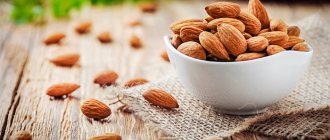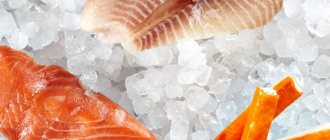Properties of ketchup
Nutritional value and composition | Vitamins | Minerals
How much does ketchup cost (average price for 1 kg)?
Moscow and Moscow region.
90 rub.
Ketchup is considered a truly universal condiment because it can be used with a wide variety of dishes - pasta, sandwiches, hamburgers, pizza, all kinds of hot and cold dishes, as well as salads.
It is interesting that this product has its culinary origins back in the 17th century, when a certain sauce called “ke-tsiap” or “koechiap” was brought from Asia to England, which translated meant “brine based on salted fish or shellfish.” It should be noted that initially the ketchup recipe did not include the use of tomatoes - the sauce was prepared from walnuts, anchovies, beans and mushrooms, which were mixed with wine, garlic and spices.
In general, the official homeland of ketchup is called the USA, and in England it was first called “catchup”, after which this name was transformed into the more familiar “ketchup”. At the end of the nineteenth century, tomatoes began to be added to ketchup, which helped the sauce become even more popular.
In addition to the store-bought product, ketchup can also be easily made at home, using fairly ripe and very juicy red tomatoes and various spices (mustard seed, nutmeg, allspice, cinnamon, ginger, cloves and many others).
BJU and KBJU of Heinz ketchup per 100 g
According to statistics, ketchup is the undisputed leader among sauces. Thanks to tomatoes and bell peppers, which contain lycopene (a carotenoid pigment), the sauce has a rich red color.
Interesting! Lycopene is a powerful antioxidant that prevents the emergence and development of malignant tumors and ischemic pathologies, and is an effective means of preventing eye diseases.
In the process of evaporating tomatoes when preparing the sauce, the amount of lycopene increases 3 times - in raw vegetables it is no more than 50 mg/kg, and in ketchup more than 150 mg/kg.
According to Roskontrol, Heinz ketchups:
- do not contain preservatives, synthetic dyes, starch;
- no GMO;
- gluten free;
- have good taste;
- The composition corresponds to the “extra” category.
We recommend that you familiarize yourself with the BZHU dishes from McDonald's
Pros of Heinz tomato sauces:
- rich vitamin composition - group B, K, P, ascorbic acid;
- salts of potassium, calcium, iron and phosphorus are present in large quantities;
- contain the antidepressant lycopene, serotonin (the hormone of happiness) and tyramine (the hormone of happiness).
Cons of ketchup:
- gastritis and heartburn may occur as an individual reaction;
- not recommended for allergy sufferers.
Important! Lycopene contained in tomato ketchup has an antitumor effect.
Tomato
The sauce recipe has remained unchanged since 1876. Ideal with meat, fish, vegetable dishes and pasta.
Tomato ketchup BZHU (100 g):
| Proteins, g | 1,2 |
| Fats, g | 0,0 |
| Carbohydrates, g | 24,3 |
| Calorie content, kcal | 110 |
Important! Moderate consumption of tomato sauce does not cause weight gain.
Italian
Thick, rich tomato sauce with Italian herbs and spices. It has a pronounced basil taste, less sour compared to Tomato.
Pairs well with meat, poultry, and fried potatoes. Ideal for Bolognese sauce and pizza.
Italian ketchup KBZHU (100 g):
| Proteins, g | 0,9 |
| Fats, g | 0,0 |
| Carbohydrates, g | 23,1 |
| Calorie content, kcal | 96 |
Spicy
Moderately spicy sauce, ideally complements meat and dough dishes (dumplings, khinkali, manti, etc.) dishes. Goes well with hot and cold sandwiches and sandwiches, fried potato dishes.
We recommend that you familiarize yourself with the BZHU doshirak
BJU spicy Heinz (100 g):
| Proteins, g | 1,0 |
| Fats, g | 0,0 |
| Carbohydrates, g | 23,7 |
| Calorie content, kcal | 96 |
Super spicy
The hottest sauce in the Heinz ketchup line. Made from classic tomato ketchup with the addition of cayenne red pepper and green jalapeno.
Goes well with light snacks, meats and sausages. It has a pronounced burning taste.
BJU and calorie content of super hot ketchup (100 g):
| Proteins, g | 0,9 |
| Fats, g | 0,0 |
| Carbohydrates, g | 23,3 |
| Calorie content, kcal | 96 |
With garlic and spices
The product has a bright garlic taste and is well compatible with meat and vegetable dishes. The sauce is a good addition to pasta and any Italian dishes.
KBJU Heinz with garlic and spices (100 g):
| Proteins, g | 1,1 |
| Fats, g | 0,0 |
| Carbohydrates, g | 24,2 |
| Calorie content, kcal | 101,2 |
For grilling and barbecue
Ketchup with black pepper and basil is the perfect complement to any dish cooked over an open fire.
Heinz KBZHU for grill and shish kebab (100 g):
| Proteins, g | 0,9 |
| Fats, g | 0,0 |
| Carbohydrates, g | 23,2 |
| Calorie content, kcal | 97 |
With mustard
The combination of the taste of tomatoes and spicy mustard is ideal for grilled dishes and sausages. With this ketchup with mustard, the taste of familiar dishes will become more piquant.
We recommend that you familiarize yourself with the BJU of sesame
BJU Heinz with mustard (100 g):
| Proteins, g | 2 |
| Fats, g | 0,2 |
| Carbohydrates, g | 25 |
| Calorie content, kcal | 110 |
Home
You can make your own delicious sauce, close in taste to Tomato Heinz.
Ingredients:
- tomatoes – 4 kg;
- onions – 5 pcs;
- vinegar 6% - 150 ml;
- sugar – 2 cups;
- salt – 3 tbsp. l.;
- ground cinnamon – 1 tsp;
- ground cloves – 0.5 tsp;
- ground paprika – 1.5 tbsp. l.;
- bay leaf – 5 pcs.;
- red pepper – 1 tbsp. l. (less possible).
Grind and rub the tomatoes and onions through a sieve. Mix with the remaining ingredients, stirring occasionally, and cook over low heat for about 5 hours. The volume will decrease by three times. Delicious homemade ketchup is ready.
Attention! For those suffering from diabetes, sugar should be replaced with fructose.
BZHU homemade ketchup (100 g):
| Proteins, g | 1,98 |
| Fats, g | 0,2 |
| Carbohydrates, g | 16,3 |
| Calorie content, kcal | 70,1 |
Types of ketchup
Depending on the culinary use, there are several types of ketchup:
- tomato ketchup;
- kebab ketchup;
- hot ketchup (chili);
- spicy ketchup;
- ketchup for national dishes.
All these types of ketchup are usually classified into 4 categories, which depend on the production method and technology. Thus, the highest quality product is considered to be in the “Extra” category, which is produced exclusively from fresh tomatoes or tomato paste with natural additives. Next come ketchups of the highest, first and second categories, which contain a small proportion of dyes, stabilizers and thickeners.
Calories Ketchup. Chemical composition and nutritional value.
Nutritional value and chemical composition of "Ketchup".
The table shows the nutritional content (calories, proteins, fats, carbohydrates, vitamins and minerals) per 100 grams of edible portion.
| Nutrient | Quantity | Norm** | % of the norm in 100 g | % of the norm in 100 kcal | 100% normal |
| Calorie content | 101 kcal | 1684 kcal | 6% | 5.9% | 1667 g |
| Squirrels | 1.04 g | 76 g | 1.4% | 1.4% | 7308 g |
| Fats | 0.1 g | 56 g | 0.2% | 0.2% | 56000 g |
| Carbohydrates | 27.1 g | 219 g | 12.4% | 12.3% | 808 g |
| Alimentary fiber | 0.3 g | 20 g | 1.5% | 1.5% | 6667 g |
| Water | 68.51 g | 2273 g | 3% | 3% | 3318 g |
| Ash | 2.94 g | ~ | |||
| Vitamins | |||||
| Vitamin A, RE | 26 mcg | 900 mcg | 2.9% | 2.9% | 3462 g |
| beta carotene | 0.316 mg | 5 mg | 6.3% | 6.2% | 1582 g |
| Lycopene | 12062 mcg | ~ | |||
| Lutein + Zeaxanthin | 161 mcg | ~ | |||
| Vitamin B1, thiamine | 0.011 mg | 1.5 mg | 0.7% | 0.7% | 13636 g |
| Vitamin B2, riboflavin | 0.166 mg | 1.8 mg | 9.2% | 9.1% | 1084 g |
| Vitamin B4, choline | 12.5 mg | 500 mg | 2.5% | 2.5% | 4000 g |
| Vitamin B5, pantothenic | 0.047 mg | 5 mg | 0.9% | 0.9% | 10638 g |
| Vitamin B6, pyridoxine | 0.158 mg | 2 mg | 7.9% | 7.8% | 1266 g |
| Vitamin B9, folates | 9 mcg | 400 mcg | 2.3% | 2.3% | 4444 g |
| Vitamin C, ascorbic acid | 4.1 mg | 90 mg | 4.6% | 4.6% | 2195 g |
| Vitamin E, alpha tocopherol, TE | 1.46 mg | 15 mg | 9.7% | 9.6% | 1027 g |
| gamma tocopherol | 0.13 mg | ~ | |||
| Vitamin K, phylloquinone | 3 mcg | 120 mcg | 2.5% | 2.5% | 4000 g |
| Vitamin RR, NE | 1.434 mg | 20 mg | 7.2% | 7.1% | 1395 g |
| Betaine | 0.2 mg | ~ | |||
| Macronutrients | |||||
| Potassium, K | 281 mg | 2500 mg | 11.2% | 11.1% | 890 g |
| Calcium, Ca | 15 mg | 1000 mg | 1.5% | 1.5% | 6667 g |
| Magnesium, Mg | 13 mg | 400 mg | 3.3% | 3.3% | 3077 g |
| Sodium, Na | 907 mg | 1300 mg | 69.8% | 69.1% | 143 g |
| Sera, S | 10.4 mg | 1000 mg | 1% | 1% | 9615 g |
| Phosphorus, P | 26 mg | 800 mg | 3.3% | 3.3% | 3077 g |
| Microelements | |||||
| Iron, Fe | 0.35 mg | 18 mg | 1.9% | 1.9% | 5143 g |
| Manganese, Mn | 0.084 mg | 2 mg | 4.2% | 4.2% | 2381 g |
| Copper, Cu | 85 mcg | 1000 mcg | 8.5% | 8.4% | 1176 g |
| Selenium, Se | 0.7 mcg | 55 mcg | 1.3% | 1.3% | 7857 g |
| Fluorine, F | 15.1 mcg | 4000 mcg | 0.4% | 0.4% | 26490 g |
| Zinc, Zn | 0.17 mg | 12 mg | 1.4% | 1.4% | 7059 g |
| Digestible carbohydrates | |||||
| Mono- and disaccharides (sugars) | 21.27 g | max 100 g | |||
| Glucose (dextrose) | 10.25 g | ~ | |||
| Sucrose | 2.3 g | ~ | |||
| Fructose | 8.72 g | ~ | |||
| Essential amino acids | |||||
| Arginine* | 0.016 g | ~ | |||
| Valin | 0.014 g | ~ | |||
| Histidine* | 0.013 g | ~ | |||
| Isoleucine | 0.014 g | ~ | |||
| Leucine | 0.021 g | ~ | |||
| Lysine | 0.023 g | ~ | |||
| Methionine | 0.005 g | ~ | |||
| Threonine | 0.019 g | ~ | |||
| Tryptophan | 0.005 g | ~ | |||
| Phenylalanine | 0.021 g | ~ | |||
| Nonessential amino acids | |||||
| Alanin | 0.033 g | ~ | |||
| Aspartic acid | 0.133 g | ~ | |||
| Glycine | 0.016 g | ~ | |||
| Glutamic acid | 0.349 g | ~ | |||
| Proline | 0.012 g | ~ | |||
| Serin | 0.021 g | ~ | |||
| Tyrosine | 0.009 g | ~ | |||
| Cysteine | 0.005 g | ~ | |||
| Saturated fatty acids | |||||
| Saturated fatty acids | 0.014 g | max 18.7 g | |||
| 16:0 Palmitinaya | 0.01 g | ~ | |||
| 18:0 Stearic | 0.004 g | ~ | |||
| Monounsaturated fatty acids | 0.015 g | min 16.8 g | 0.1% | 0.1% | |
| 16:1 Palmitoleic | 0.001 g | ~ | |||
| 18:1 Oleic (omega-9) | 0.015 g | ~ | |||
| Polyunsaturated fatty acids | 0.041 g | from 11.2 to 20.6 g | 0.4% | 0.4% | |
| 18:2 Linolevaya | 0.039 g | ~ | |||
| 18:3 Linolenic | 0.001 g | ~ | |||
| Omega-3 fatty acids | 0.001 g | from 0.9 to 3.7 g | 0.1% | 0.1% | |
| Omega-6 fatty acids | 0.039 g | from 4.7 to 16.8 g | 0.8% | 0.8% |
The energy value of Ketchup is 101 kcal.
- cup = 240 g (242.4 kcal)
- tbsp = 15 g (15.2 kcal)
- packet = 6 g (6.1 kcal)
Primary source: USDA National Nutrient Database for Standard Reference. Read more.
** This table shows the average levels of vitamins and minerals for an adult. If you want to know the norms taking into account your gender, age and other factors, then use the “My Healthy Diet” application.
The benefits of ketchup
Rarely does anyone talk about the benefits of ketchup, which, although not unreasonable, is not entirely true. The fact is that a natural, high-quality product contains a substance called lycopene, which gives vegetables their red color. It has a clear antitumor effect and reduces the risk of heart disease.
In addition, the benefits of ketchup for a person’s mental balance are justified, because this product contains serotonin - the “happiness hormone”. Therefore, we can call this sauce a natural antidepressant.
Tomato ketchup Makheev: calorie content per 100 grams, bju
The calorie content of Makheev tomato ketchup per 100 grams is 80 kcal. 100 g of product contains:
- proteins – 1.4 g;
- fats – 0 g;
- carbohydrates – 18.6 g.
The composition of the sauce is less natural than in the case of Heinz ketchup. Thus, to prepare Maheev, tomato paste, drinking water, starch, acetic acid, ground pepper, dried onions and garlic, preservatives, including sodium benzoate and potassium sorbate are used.
Read: Calorie content of vinaigrette with butter and potatoes
Despite the fact that the use of preservatives is not prohibited by the requirements of the current GOST, it is better to avoid getting such substances into the body. Numerous studies have proven that preservatives disrupt the functioning of the gastrointestinal tract, worsen appetite, and contribute to exacerbations of chronic liver and kidney diseases.
Homemade ketchup: calorie content per 100 grams, bju
The calorie content of homemade ketchup per 100 grams is 32 kcal. In 100 g of product:
- proteins – 1.15 g;
- fats – 0.19 g;
- carbohydrates – 7.22 g.
The following ingredients are required for preparation:
- 0.5 kg of tomatoes;
- 1 PC. onions;
- 0.4 kg of sweet bell pepper;
- 0.15 kg sour apples;
- 1 tablespoon grape vinegar;
- 1 tablespoon of seasonings;
- 4 cloves of garlic;
- cinnamon, salt, sugar, pepper to taste.
Read: Calorie content of instant coffee with milk
Recipe:
- peppers, apples and tomatoes are peeled;
- apples and onions are coarsely chopped;
- garlic is squeezed through a press;
- the above ingredients (except garlic) are placed in a saucepan and cooked until a soft consistency is obtained;
- the mixture is poured into a blender, mixed with garlic;
- salt, pepper, sugar, cinnamon, seasonings and vinegar are added to the resulting vegetable mass;
- bring the ketchup to a boil over low heat with gentle stirring;
- let the sauce cool. Ketchup is ready!
Vitamins
Of the fat-soluble vitamins, ketchup contains A, beta-carotene, E and K. Of the water-soluble vitamins, there are vitamins C, B1, B2, B3 (PP), B4, B5, B6 and B9.
>»> >»> >»> >»> >»> >»> >»> >»> >»> >»> >»> >»> >»> >»> >»> >»> >»>
| Vitamins, content | Share of daily value per 100 g | |
| Vitamin A | 26.0 mcg | 2,9% |
| Beta carotene | 316.0 mcg | 6,3% |
| Alpha carotene | 0.0 µg | 0,0% |
| Vitamin D | 0.0 µg | 0,0% |
| Vitamin D2 | n/a | 0,0% |
| Vitamin D3 | n/a | 0,0% |
| Vitamin E | 1.5 mg | 10,0% |
| Vitamin K | 3.0 mcg | 2,5% |
| Vitamin C | 4.1 mg | 4,6% |
| Vitamin B1 | 0.0 mg | 0,9% |
| Vitamin B2 | 0.2 mg | 12,8% |
| Vitamin B3 | 1.4 mg | 9,0% |
| Vitamin B4 | 12.5 mg | 2,5% |
| Vitamin B5 | 0.0 mg | 0,9% |
| Vitamin B6 | 0.2 mg | 12,2% |
| Vitamin B9 | 9.0 mcg | 2,3% |
| Vitamin B12 | 0.0 µg | 0,0% |
The harm of ketchup
As already mentioned, ketchup has a number of contraindications. You should avoid using the sauce:
- during exacerbations of diseases of the liver, kidneys, and gastrointestinal tract;
- in case of individual intolerance to the ingredients of the sauce;
- if allergic reactions to the product occur.
Ketchup is full of sugar, so it is contraindicated for diabetes. Low-quality sauce is made using chemical dyes and flavor enhancers. Such components of ketchup can provoke oncology, chronic diseases of the gastrointestinal tract and other negative consequences.
SUBSCRIBE TO SITE UPDATES
Ketchup contains 27.4 g of carbohydrates per 100 g of product, which is approximately 96% of the total energy per serving or 110 kcal. Calorie content - 101 kcal. Ketchup composition:
fats - 0.10 g, proteins - 1.04 g, carbohydrates - 27.40 g, water - 68.51 g, ash - 2.94 g.
Total sugar content - 21.3 g, fiber - 0.3 g, starch - n/a.
Cholesterol content - 0.0 mg, trans fats - 0.0 g.











